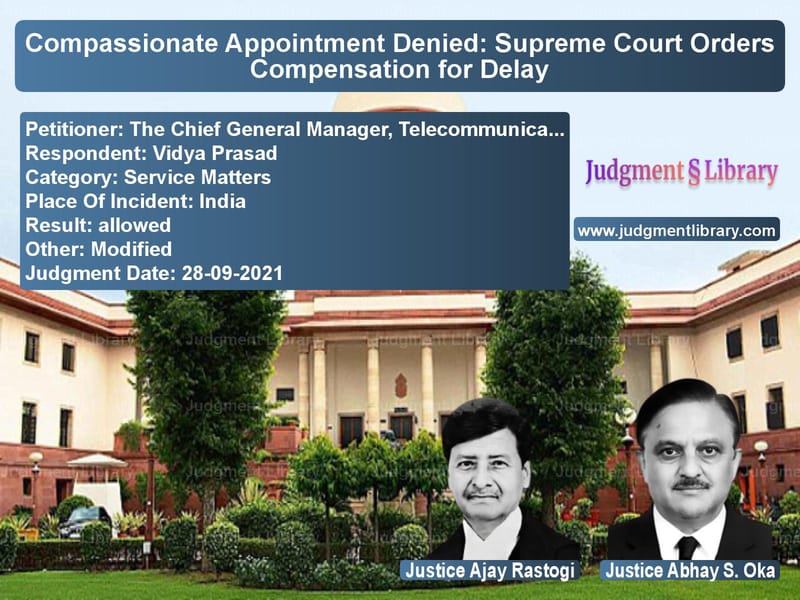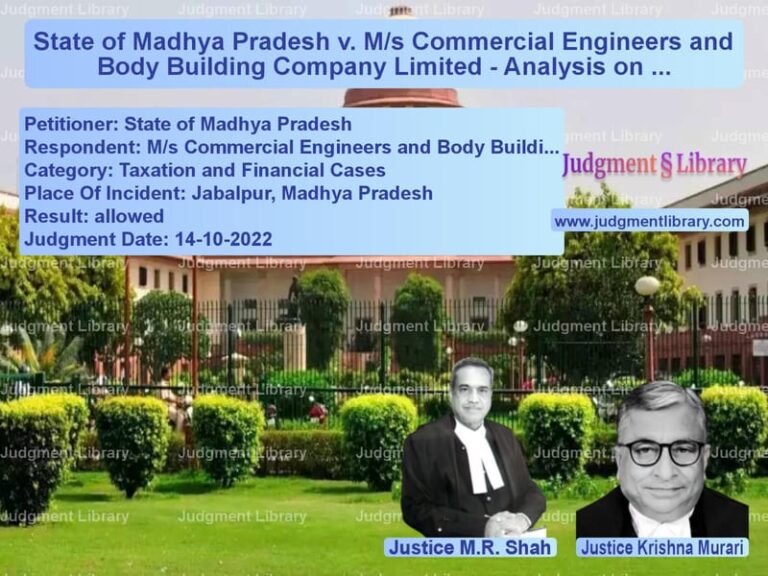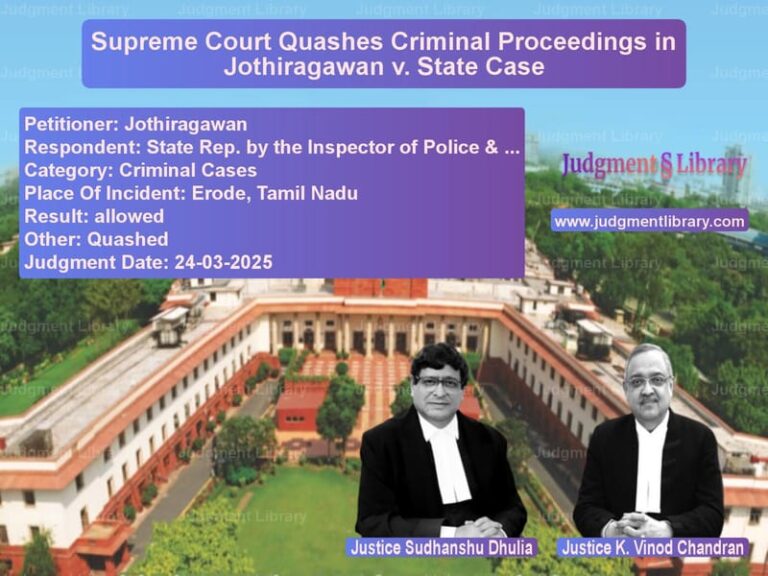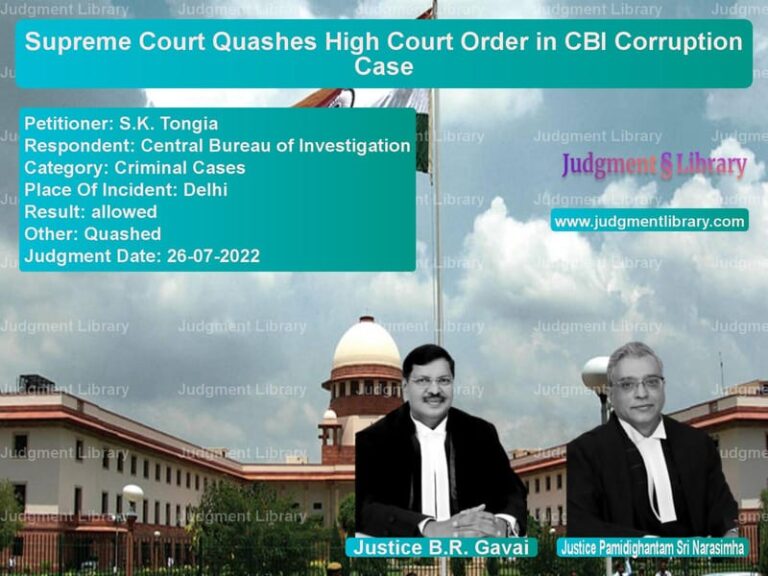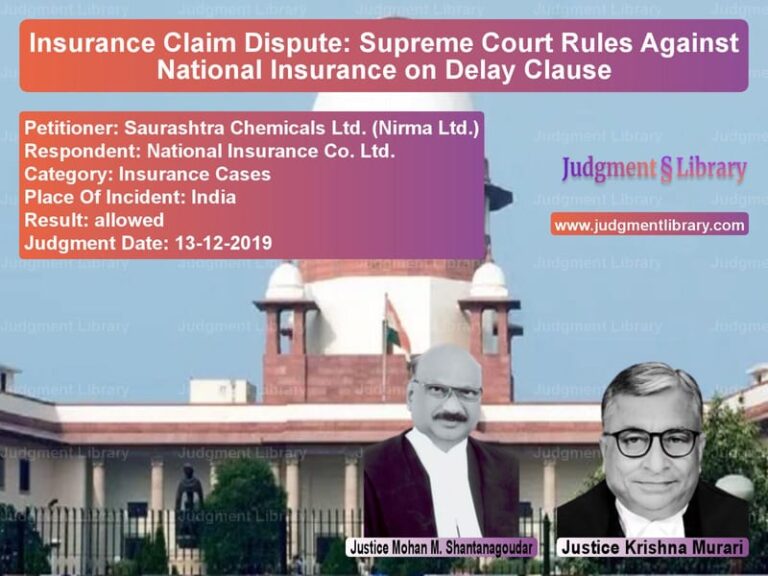Compassionate Appointment Denied: Supreme Court Orders Compensation for Delay
The case of The Chief General Manager, Telecommunication, BSNL & Ors. vs. Vidya Prasad highlights the consequences of bureaucratic delays in considering applications for compassionate appointments. The Supreme Court had to determine whether the respondent, whose application for a job under the 1998 scheme was denied due to prolonged inaction by the authorities, was entitled to relief in the form of compensation.
Background of the Case
The respondent’s father, employed as a Telephone Mechanic with BSNL, passed away while in service on February 7, 2003. Following his father’s death, the respondent submitted an application for compassionate appointment on October 15, 2004. The necessary formalities were completed on July 3, 2005, and at the time of submission, the applicable scheme for compassionate appointments was the 1998 scheme.
However, the BSNL authorities did not act on the application promptly. Instead, the application remained pending until June 27, 2007, when BSNL introduced a new weightage point system, which significantly altered the eligibility criteria. When the respondent’s application was finally reviewed in September 2007, it was rejected based on the new scheme.
Legal Issues Raised
- Whether the respondent’s application for compassionate appointment should have been considered under the 1998 scheme, which was in force at the time of submission.
- Whether BSNL’s delay in processing the application led to an unfair denial of employment.
- Whether the High Court was justified in awarding Rs. 10 lakh as compensation instead of directing appointment.
Petitioner’s Arguments (BSNL)
BSNL contended:
- The policy governing compassionate appointments had changed by the time the application was considered, and the respondent no longer met the new criteria.
- There was no legal obligation to process applications immediately; the department followed standard administrative procedures.
- The High Court’s decision to award compensation was excessive and should be reconsidered.
Respondent’s Arguments (Vidya Prasad)
The respondent argued:
- His application was submitted under the 1998 scheme, which should have been the basis for consideration.
- BSNL’s failure to act in a timely manner unfairly deprived him of employment.
- The transition to the new scheme in 2007 should not have impacted applications already submitted.
- The prolonged delay in processing the application amounted to a violation of his right to fair consideration.
Supreme Court’s Judgment
The Supreme Court ruled in favor of the respondent, acknowledging that the delay was entirely attributable to BSNL. However, since the respondent had already crossed the age of 50 by the time the case reached the High Court, appointment was no longer a viable remedy.
Key Observations by the Court:
“It is always said that delay denies justice, and the present respondent became a victim of the total inaction on the part of the appellants and its officials in not putting heed to the application which was submitted by the family of the deceased employee.”
“The indigent family who has lost their breadwinner in seeking compassionate appointment to which one of the dependents was otherwise entitled to under the law became a victim of irresponsible attitude and red tapism which is prevalent in the office of the appellants.”
Reduction of Compensation:
The Supreme Court, while affirming the principle of compensating the respondent, modified the High Court’s ruling and reduced the amount from Rs. 10 lakh to Rs. 5 lakh. The Court reasoned that while the respondent was unfairly denied employment, the amount of compensation needed to be proportionate.
Final Directions:
- BSNL was ordered to pay Rs. 5 lakh to the respondent within four weeks.
- Failure to make the payment within the stipulated time would result in an interest penalty of 9% per annum.
Impact of the Judgment
- Reinforces the principle that applications for compassionate appointment must be considered under the policy in force at the time of submission.
- Holds government and public sector employers accountable for unreasonable delays in processing applications.
- Establishes that monetary compensation can be an appropriate remedy when employment is no longer feasible due to delays.
Conclusion
The Supreme Court’s decision in The Chief General Manager, Telecommunication, BSNL & Ors. vs. Vidya Prasad underscores the importance of timely decision-making in cases involving compassionate appointments. The ruling sends a strong message to public sector employers that bureaucratic delays should not result in injustice to applicants. While the judgment did not grant employment due to practical limitations, it ensured that the respondent was fairly compensated for the undue hardship caused by administrative inaction.
Petitioner Name: The Chief General Manager, Telecommunication, BSNL & Ors..Respondent Name: Vidya Prasad.Judgment By: Justice Ajay Rastogi, Justice Abhay S. Oka.Place Of Incident: India.Judgment Date: 28-09-2021.
Don’t miss out on the full details! Download the complete judgment in PDF format below and gain valuable insights instantly!
Download Judgment: the-chief-general-ma-vs-vidya-prasad-supreme-court-of-india-judgment-dated-28-09-2021.pdf
Directly Download Judgment: Directly download this Judgment
See all petitions in Recruitment Policies
See all petitions in Public Sector Employees
See all petitions in Disciplinary Proceedings
See all petitions in Pension and Gratuity
See all petitions in Judgment by Ajay Rastogi
See all petitions in Judgment by Abhay S. Oka
See all petitions in allowed
See all petitions in Modified
See all petitions in supreme court of India judgments September 2021
See all petitions in 2021 judgments
See all posts in Service Matters Category
See all allowed petitions in Service Matters Category
See all Dismissed petitions in Service Matters Category
See all partially allowed petitions in Service Matters Category

